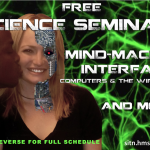
To do science, we need government funding. However you feel about the free market, there just isn't a way for the free market to work on basic research. It's too risky, with not enough profitability. The things I discover in lab next week will never make me rich, and I'm not aware of many Nobel winners that did their work in private industry. We need the government to pay for what we do.
And we don't cost that much. Take a look at this chart and see if you can find how much we spend on scientific discovery. Go ahead, I'll wait.
Still looking? Might want to try full screen.
There are a lot of…
One of my favorite places on the internet is r/askscience, a place on reddit where people come and ask questions, and a panel of scientists answer. People can ask follow-up questions, and there is often some great back-and forth (to be honest, part of the reason I haven't been writing as much here is because I'm using up all my time over there). Recently, an number of people have been asking questions about allergies - Can people grow out of allergies? Why is the incidence of allergies increasing? Can eating honey cure allergies?
You can check out those threads if you want answers to those…
Well, this is going to be embarrassing.
This year, some friends and I are participating in "Movember," an effort to raise money for prostate cancer research by having men embarrass themselves with ridiculous mustaches This is a shot of me this past weekend:
But alas, that fine follicular growth is entirely artificial.
If you've ever read the description under my picture to the left, and wondered what I'm talking about when I say "genetically incapable of growing facial hair," you'll get a chance to see exactly what I mean. And since my "mustache" is going to be such a travesty, I hope to…
Last month, I linked to an article written by Harvard graduate student Laura Strittmatter about Resveratrol, a compound in red wine that had been linked to anti-aging effects in studies on rodents. Recently, a paper was published in Nature calling that research into question. This isn't a problem in science - this is how it's supposed to work. New research examines previous claims, and strengthens the case or knocks it down. Either way, we win.
In that spirit, Laura picked through the new paper and brings us a special edition of the Flash:
A recent article in the journal Nature calls into…
Disclosure Note: I was given a free digital copy of this book for review.
Thrillers aren't typically my cup of tea. I most often stick to non-fiction, and when it comes to novels, I tend to favor books that use the plot to develop characters, rather than the other way around. But when Amy Rogers sent me a copy her novel Petroplague, she billed it as "fictionalized science, not science fiction," and I was intrigued. Coupled with the fact that it's a book about bacteria and about energy and about science, I couldn't say no.
Some spoilers follow, but as we now know, spoilers don't actually spoil…
While researching my recent post on the Nobel Prize, I discovered that the website has a series of "educational productions," including games and written/illustrated primers on different topics. I've been playing the malaria game all morning - you have to fly a mosquito around drinking the blood of humans while avoiding bug spray and mosquito nets and birds, but first you get a little lesson telling you about how malaria is transmitted.
Or play immune system defender where general macrophage teaches you how to hunt down the nefarious bacterial invaders.
The written articles are pretty good…
"We're all violent inside, we're all Hilter inside, and we're all Christ inside. Just try to work on the good bit..."
Monday's announcement for the Nobel Prize in physiology or medicine should have been a happy occasion for my lab. On the one hand, it was given for early discoveries in the field of innate immunity - my field! On the other hand, it was given to a scientist that many* feel is undeserving of the honor, while at the same time sullying the legacy of my scientific great-grandfather.
Let me explain.
The Context
In the late 1980's, immunologists were riding high. Much of the experimental attention in previous decades had focused on T-cells and B-cells, the drivers of "adaptive immunity," and it…
Christie Wilcox has a great post over at Science Sushi about why scientists should be on social media. I don't disagree with anything she says, and I try to do it myself (see: the twitter and G+ links to the left... I also recently signed up for tumblr which is kind of fun). But sometimes the social media is just the first step.
Last night I, along with fellow graduate students Sky Brubaker and Jillian Astarita, gave a lecture for the Science in the News lecture series about how an immune response gets started. The SITN fall lecture series is something I've done for the past few years, first…
In other words, you're more likely to catch a cold from shaking their hand than to get an STI from Sitting on the same bench.
There isn't much reason to fear getting a sexually transmitted disease from naked sitters. These infections are most commonly the result of vigorous and prolonged exposure of a person's mucous membranes, the thinner and more permeable skin found in the mouth and on the genitals. If you happened to share a seat with an infected nudist, you'd be protected both by your clothes and by your epidermis, which serves as an effective barrier against pathogens all by itself.…
For anyone in the Boston Area, two of my colleagues and I will be giving a talk on how the immune system recognizes and responds to pathogens, and how understanding this will allow scientists to design better vaccines and more effectively treat illness.
How to Spot a Virus: The origins of an immune response.
This lecture series is aimed at a general audience and it starts at 7pm tomorrow (Wednesday) night at Armenise Amphitheater at the Harvard Medical School. Come watch! (and stop by to say "hi" afterwards).
----
Full schedule:
SITN archives.
Last year's lecture series on Vimeo.
I pledged to donate a bit every month for the next 6 months. I've been so cynical about politics recently, but I decided if I hear something I believe in, I should put my money where my mouth is.
I'll have to cut back on the coffee though...
Via Slog.
Jad Abumrad, co-host of the amazing "Radiolab" just won a McArthur genius grant - a $500,000 prize with almost no limits on how to spend it.
If you've never listened to Radiolab, stop reading blogs, go download an episode sit back with a good pair of headphones. It's beautifully produced, a joy to listen to, and tells great science stories to boot. Many of my stock cocktail-party (or more often bar) stories should come with the disclaimer "I learned this on Radiolab."
The last episode on "Games," was fantastic, especially since I listened to it just after doing this year's fantasy football…
Harvard Science in the News begins its fall lecture series this week with a talk on the interface between human brains and machines:
I went to the practice talk last week, and it's going to be great! From retinal implants to controlling robots with your mind, Harvard neuroscience graduate students will take you through the science behind melding mind with machine. The lecture is tomorrow (wednesday) night at 7pm in the Armenise amphitheater at the Harvard Med School. Check out the website for more info.
Next week: Me! I'll be presenting next wednesday along with my lab mate Sky Brubaker and…
The latest Science in the News Flash is up, and it examines the anti-aging research surrounding the molecule resveratrol, which is present at low concentrations in red wine:
If resveratrol were able to mimic the lifespan-extending effects of caloric restriction in people without requiring such an extreme diet, it would be very popular, especially if it gives people an excuse to drink more wine! However, to consume enough resveratrol to benefit from the life-extending effects seen in yeast, the average person would have to drink 1000 bottles of wine per day, an endeavor with consequences that…
When folks in my lab think about biological problems, we think about basics. A pathogen has some molecular component that trips a sensor on the outside of a cell. That sensor (the receptor) grabs on to some adapter proteins and starts a cascade of chemical reactions catalyzed by various enzymes, which eventually leads to the activation of a transcription factor or factors that changes the behavior of a cell. We think at the level of the cell, at the level of the protein and at the level of the molecule. Occasionally, if we write a paper and the reviewers insist, we might do an assay to see if…
And speaking of milestones, the Harvard Science in the News Flash - a student written and student edited writing series just posted their 100th article:
Sleep clears the mind: How sleep prepares the brain for new learning
Despite the fact that sleep is essential to our health, its function and what makes it necessary have remained mysterious. Over the years, scientists have accumulated data showing that sleep, or the lack thereof, affects the brain. Most of this work focused on the idea that sleep is important for consolidating newly formed memories. However, evidence is now building that…
I got this e-mail from the president of my school yesterday:
Dear Members of the Harvard Community:
Starting this October, Harvard will celebrate its 375th birthday. Such milestones encourage us to reflect on our institution's remarkable past--to remember that all we aspire to today finds inspiration in the creativity and commitment of those who have come before.
Even more, our forebears' example reminds us that, while we stand on the foundations they have built, we must never stand still. Our history not only provides us with a sense of continuity and confidence; it highlights Harvard's…
I'm a little behind on TV, so I was catching up on the Daily Show this morning. Last Thursday had one of the best segments I've ever seen (and that bar is pretty high):
The Daily Show - World of Class Warfare - Warren Buffett vs. Wealthy ConservativesGet More: Daily Show Full Episodes,Political Humor & Satire Blog,The Daily Show on Facebook
The Daily Show - World of Class Warfare - The Poor's Free Ride Is OverGet More: Daily Show Full Episodes,Political Humor & Satire Blog,The Daily Show on Facebook
The impetus for this segment was this op-ed in the New York Times by…
A 5.8 magnitude earthquake rocked the east coast yesterday, freaking everyone out, causing schools and offices to close, and causing general mayhem:
(Source)
I didn't feel it, and growing up in California, it might not have even registered. Then again, the reaction (general fear, disbelief, and confusion) is about what I would expect if we received even a half inch of snow in San Diego. But maybe now people out here in Boston won't be so confused when I mention my deep-seated fear of brick buildings.
In other "disaster" related news, my computer has a fresh hard-drive, though I had to…





